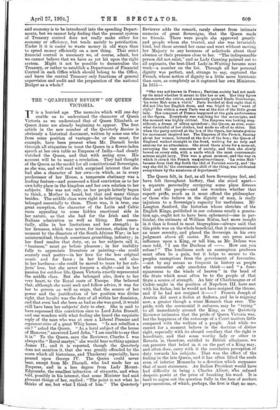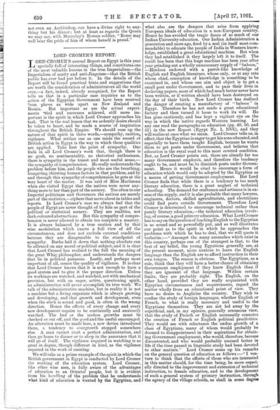• THE "QUARTERLY REVIEW" ON QUEEN VICTORIA.
IT is a hurried age. The memoirs which will one day enable us to understand the character of Queen Victoria as we understand that of Queen Elizabeth or Queen Anne are already beginning to appear. The first article in the new number of the Quarterly Review is obviously a historical document, written by some one who from some position of vantage—he or she must, for example, have been present when Mr. Disraeli broke through all etiquette,s to toast the Queen in a flower-laden speech at her own table as Empress of India—had closely watched the Queen, and that with seeing eyes. His account will be to many a revelation. They had thought of the Queen as the model for all constitutional Sovereigns, as she was, and will read with surprised interest that she had also a character of her own—in which, as in every predecessor of her House, a temperate obstinacy was a leading feature—and possessed a fixed conviction as to her own lofty place in the kingdom and her own relation to her subjects. She was not only, as her people latterly began to thint-, a Mother in Israel, but that and many things besides. The middle class were right in believing that she belonged essentially to them. There was, it is true, one great exception, the character of the Latin and' Celtic races appealing to some hidden emotional side in her nature, so that she had for the Irish and the Italians admiration as well as liking. But essen- tially, alike in her limitations and her strength ; in her firmness, which was never, for instance, shaken for a moment by the disasters of the South African War; in her unintermitted, though sometimes grumbling, industry ; in her fixed resolve that duty, or, as her subjects call it, "business," must go before pleasure ; in her inability fully to appreciate literature or painting—she could scarcely read poetry—in her love for the less original music and for farce ; in her kindness, and also in her hardness—she could be moved to tears by her sub- jects' love, but she never forgave a slight—and in her passion for outdoor life, Queen Victoria exactly represented the middle class. But she belonged lso, down to her very heart, to the Royal caste of Europe. She believed that, although she must seek and follow advice, it was for her to govern as well as reign, that the source of her power and the justification of her position was divine right, that loyalty was the duty of all within her dominion, and that even had she been as bad as she was good, it would still have been her subjects' duty to obey. She is said to have expressed this conviction once to Lord John Russell, and one wonders with what feeling she heard the exquisite reply of the man who was at once a Liberal Premier and representative of a great Whig house. "Is not rebellion a sin ? " asked the Queen. " As a loyal subject of the house of Hanover," answered Lord John, "I am unable to say that it is." To the Queen, says the Reviewer, Charles I. was always the "Royal martyr," she would hear nothing against .Tames II., and it is reported, though the Quarterly does not mention it, that she was greatly offended by the scorn which all historians, and Thackeray especially, have poured upon George IV. The Queen could never bear, except from Mr. Disraeli, who had made her an Empress, and in a less degree from Lady Mount- _ Edgcumbe, the smallest infraction of etiquette, and when told, possibly in his interest, that some Minister had said pleasant things of her, replied : "The point is not what he thinks of me, but what I think of him." The ' Quarterly Reviewer adds the remark, rarely absent from intimate memoirs of great Sovereigns, that the Queen made no friends. There were people she approved greatly. and people whom she trusted, and she was invariably End, but those around _her came and went without moving her Majesty to any keenness of solicitude about their absence or their presence close to her. "The indispensable person did not exist," and as Lady Canning pointed out -to all aspirants, the best-liked Lady-in-Waiting became next week—a number on the list. Through all her personal dignity was perfect, and, strange to say, captured the French, whose notion of dignity is a little more histrionic than ours, as completely as it captured her own Ministers. In 1855— " She was not known in France ; Parisian society had not made up its mind whether it meant to like her or net. Her tiny figure disconcerted the critics, and somebody quoted Emile Deschamps, 'La reine Blab nous a visite.' Paris decided at first sight that it did not like her English dress, and was frigid to her want of style.' But within a week Paris was at the feet of the little great lady. Her conquest of France happened at the gala performance at the Opera. Everybody was watching for the sovereigns, and the moment was highly critical. The Empress was looking mag- nificent, a dream of silken splendour ; the Queen, as ever, some- what disdainful of her clothes, bad made no effort to shine. But when the party arrived at the box of the Opera, her innate genius for movement inspired her. The Empress of the French, raising about her women, loitered at the door of the box ; the Queen of England walked straight to the front, waiting for no help and anxious for no attendance. She stood there alone for a moment, surveying the vast concourse of society, and then she slowly bowed on every side, with a smile which the most consummate actress might envy. This was a great moment, and the way' in which it struck the French weal extraordinary. La reine Blab' became from that day forth the idol of Parisian society, and 'the way she did it,' the consummate skill of the thing, was celebrated everywhere by the amateurs of deportment" • The Queen felt, in fact, as all born Sovereigns feel, and have felt throughout history, that she stood apart— a separate personality occupying some place between God and the people—and one wonders whether - that superb pride, much as it must offend the philosopher, or those who believe in the dignity of man, . is really injurious to a Sovereign's capacity for usefulness. Mr, Langton Sanford, the historian whose sketches of the English Kings, published in our columns nearly, a genera- tion ago, ought not to have been ephemeral—one in par- ticular, the estimate of William Rufus, had more insight in it than is found in most biographies—always said ..that this pride was on the whole beneficial, that it communicated an inner serenity, and placed the Sovereign in his own judgment above all castes. No one can press social influence upon a King, or tell him, as Mr. -Delano was once told, "I am the Duchess of —. How can you refuse ? " The loneliness such an assumption produces must often be a pain, but it helps to secure to du peoples exemptions from the government of favourite:. —not by any means so frequent in history as . people who remember only anecdotes think — and "a.: four. squareness to the winds of heaven " in the head of the State which must often be to the people of that State a source of strength. An heir of Charlemagne or of Cedric might in the position of Napoleon Ill, have met with his Sedan, but he would not have resigned the throne, and if he had not resigned it—? Francis Joseph of Austria did meet a Sedan at Sa,dowa, and he is reigning now, a greater though a wiser Monarch than ever. The pride, with the ceremonial it enforces, may be " trying " to all immediately, around the King, as the Quarterly Reviewer intimates that the pride of Queen Victoria was. but the happiness of the entourage of a Court matters little compared with the welfare of a people. And while we cannot for a moment believe in the doctrine of divine right, especially with its absurd corollary that the right is hereditary, and that some worthy lady or other , in Bavaria is, therefore, entitled to British allegiance, we can perceive that belief, in it on the part of a King may. and often does, carry with it the correlative perception. of duty towards his subjects. That was the effect of the feeling in the late Queen, and it has often lifted the souls even of inferior Monarchs to a devotion which surpasses that of most statesmen. An Italian President would have had difficulty in being a Charles Albert, wlio re,fesed despotic power at the price of breaking his word. It is hard to argue out the question fully in the face of modern prepossessions, of which, perhaps, the first is that no ras,n, not even an Archbishop, can have a divine right to any- thing but his dinner ; but at least as regards the Queen we may say, with Macaulay's Roman soldier, "Rome may well bear the pride of him of whom herself is proud."























































 Previous page
Previous page